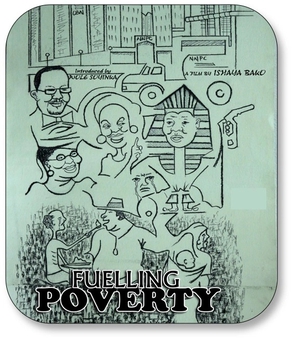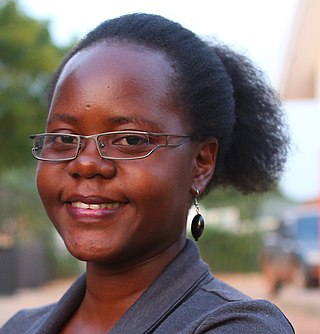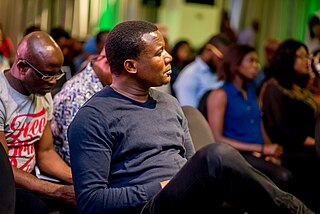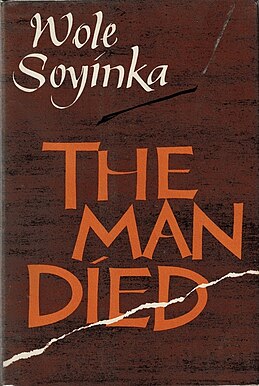Related Research Articles

Akinwande Oluwole Babatunde "Wole" Soyinka is a Nigerian playwright, novelist, poet, and essayist in the English language. He was awarded the 1986 Nobel Prize in Literature for his "wide cultural perspective and... poetic overtones fashioning the drama of existence", the first sub-Saharan African to win the Prize in literature.
Death and the King's Horseman is a play by Wole Soyinka based on a real incident that took place in Nigeria during the colonial era: the horseman of a Yoruba King was prevented from committing ritual suicide by the colonial authorities. In addition to the intervention of the colonial authorities, Soyinka calls the horseman's own conviction toward suicide into question, posing a problem that throws off the community's balance.

The University of Lagos (UNILAG) is a public research university located in Lagos, Nigeria, which was founded in 1962. UNILAG is one of the first generation universities in Nigeria and is ranked among the top universities in Africa in major education publications. The university presently has three campuses in the mainland of Lagos. Whereas two of its campuses are located at Yaba, it's college of medicine is located at Idi-Araba, Surulere. Its main campus is largely surrounded by the Lagos lagoon and has 802 acres of land. As at 2024, the University of Lagos admits around 8,500 undergraduate students annually and enrolls over 57,000 students.

The National Theatre, Nigeria is the primary centre for the performing arts in Nigeria. The monument is located in Iganmu, Surulere, Lagos. Its construction was completed in 1976 in preparation for the Festival of Arts and Culture (FESTAC) in 1977.
Wole Oguntokun was a Nigerian playwright, dramaturge, director and was the artistic director of Theatre Planet Studios and Renegade Theatre as well as a member of the board of Theaturtle, a Canadian theatre company. He was also a theatre administrator and newspaper columnist.

Kongi's Harvest is a 1970s Nigerian drama film directed by Ossie Davis. The film was adapted from a screenplay by Wole Soyinka adapted from his 1965 play of the same name. Soyinka, a Nigerian playwright, poet, and the first African to be awarded the Nobel Prize in Literature in 1986, also starred in the leading role as the dictator of an African nation.
Ishaya Bako is a Nigerian film director and screenwriter.

Fuelling Poverty is a 2012 Nigerian documentary by Ishaya Bako that narrates the activities of the Occupy Nigeria movement when it was at its climax in early 2012. The 28 minutes video also features special appearances from Nobel Laureate Wole Soyinka, Femi Falana, Nasir Ahmad el-Rufai, Seun Kuti and Desmond Elliot. It won the Best Documentary award at the 9th Africa Movie Academy Awards.
Jimi Solanke was a Nigerian film actor, dramatist, folk singer, poet and playwright.

Femi Adebayo Salami(born December 31, 1978) is a Nigerian film director, actor, lawyer, producer and special adviser to the Governor of Kwara State on Arts, Culture, and Tourism. He is the son of actor Adebayo Salami.

Ber Anena born and previously published as Harriet Anena is a Ugandan writer and performer, whose writing includes poetry, nonfiction and fiction. She is the author of a collection of poems, A Nation In Labour, published in 2015, won the 2018 Wole Soyinka Prize for Literature in Africa. The Economist described her poetry performance as "an arresting evocation of love and war".
Niji Akanni is a Nigerian dramatist, screenwriter, director, producer and filmmaker.

Femi Odugbemi is a Nigerian writer, filmmaker, television producer and the founder and executive producer of Zuri24 Media, a content production company in Lagos.

Kọ́lá Túbọ̀sún is a Nigerian linguist, writer, translator, scholar, cultural activist and film-maker. His work and influence span the fields of education, language technology, literature, journalism, and linguistics. He is the recipient of the 2016 Premio Ostana "Special Prize" for Writings in the Mother Tongue for his work in language advocacy. He writes in Yoruba and English, and is currently the Africa editor of the Best Literary Translations anthology, published by Deep Vellum.

Femi Falana, SAN is a Nigerian lawyer and human right activist. He is the father of a Nigerian rapper Folarin Falana popularly known as Falz.
Ripples Nigeria is a Nigerian online newspaper based in Lagos. It was launched in 2015. It is an independent, pro-investigation multi-media online news platform focused primarily on politics, policy and economy.
James Amuta is a film producer, director, aerial cinematographer and publicist. He is best known for his documentary film "Nightfall in Lagos" which was nominated for the best documentary film in 2018 by the Africa Magic Viewers' Choice Award.
Elesin Oba, The King's Horseman is a 2022 Yoruba-language Nigerian historical drama film directed by Biyi Bandele and distributed by Netflix, based on Wole Soyinka'sDeath and the King's Horseman, a stage play he wrote while in Cambridge, where he was a fellow at Churchill College during his political exile from Nigeria, and it is based on a real incident that took place in Yorubaland during British Colonial rule. The film stars Odunlade Adekola as the titular character, with Shaffy Bello, Brymo, Deyemi Okanlawon, Omowunmi Dada, Jide Kosoko, Langley Kirkwood, Joke Silva amongst others in supporting roles.
Movement - Japa is a Nigerian television series written by Bode Asiyanbi and produced by Femi Odugbemi. The series is centred mainly on the lives of Nigerian youths who were forced to marking critical and bad decisions due to challenges from the society.

The Man Died: Prison Notes is a 1972 non-fiction book by Wole Soyinka that explores Soyinka's experiences in prison during the Nigerian Civil War. In 1984, a Nigerian court banned the book. In 2011, The Guardian included The Man Died on their list so of the 100 greatest non-fiction books.
References
- ↑ "- YouTube". YouTube .
- ↑ "Abobaku! - The Nation". thenationonlineng.net. 31 March 2015. Retrieved 12 April 2015.
- ↑ "Nigeria's Femi Odugbemi becomes member of Oscars voting academy". Punch Newspapers. 26 June 2018. Retrieved 27 July 2022.
- ↑ "AMAA 2010: 280 films entered, as Ghana hosts nomination party - Vanguard News". vanguardngr.com. 7 March 2010. Retrieved 12 April 2015.
- ↑ Krings, M.; Okome, O. (2013). Global Nollywood: The Transnational Dimensions of an African Video Film Industry. Indiana University Press. p. 44. ISBN 9780253009425 . Retrieved 12 April 2015.
- ↑ "Ten Years After, Ab'obaku Movie Chimes at 2020 WSICE – THISDAYLIVE". www.thisdaylive.com. Retrieved 27 July 2022.
- ↑ Online, Tribune (19 July 2020). "At 2020 WSICE, ritual suicide resurfaces". Tribune Online. Retrieved 27 July 2022.